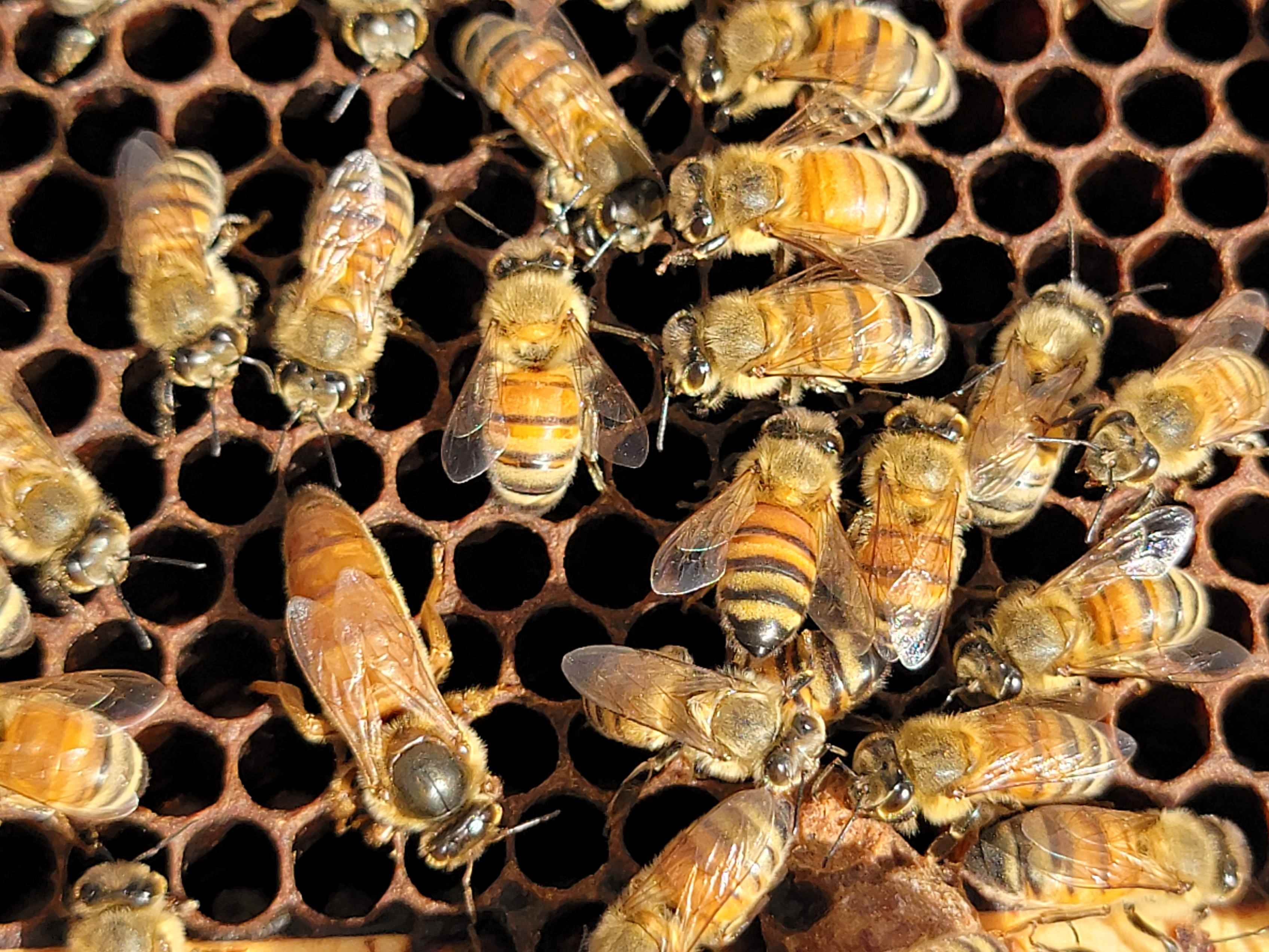The incense of cedar lulls guards into a sleepy mode, so their angry violin music softens. They return to the palace. Smoke reduces their vigilance and sends them searching inside for honey stores.
This behavior is exactly what beekeepers want before they inspect hives, so they utilize handheld smokers to create a shield before opening the boxes. Worker bees know fire threatens the colony and react in an unusual way to this danger.
“If bees smell smoke, they start gorging on honey in case they have to leave for safer territory,” said Giles D. B. Paget-Wilkes, who has kept bees for close to 70 years. “It takes about five pounds of honey for bees to make one pound of wax. The bees prioritize storing honey so they can make the comb and get on with life again if they have to relocate.”
He and Rosanna Callahan are members of the Lake County Beekeepers. They volunteer weekly to manage the club’s apiary at the Lake County UF/IFAS Extension Office in Tavares.
He expressed concern about the encroachment of African bees. “We (beekeepers in Florida) are on the front line of the war against Africanized bees.”
Wilkes added, “I grew up with African bees, and they are more defensive. The Brazilians experimented with African bees, then let them go. Now those African bees are working their way up through the Americas.”
“Bees are fascinating, and there’s always something to learn about them,” Callahan said. She rests a few minutes due to the heat. “Inside the bee suits, the temperature can get to 120 degrees.”
There are more than 5,000 registered backyard beekeepers in Florida, according to Wilkes.
“The queen sets the temperament of the colony,” he said. “If she is feisty, so are the rest. But if we get a crazy queen, we send her to the Tower of London.” He grinned.
Wilkes and Callahan move with methodical care lifting frames and examining sections for bee health. “You’ve got to watch where you put your hands,” he said. “Bees don’t want to be squished. They don’t want to sting. That’s their last resort because after, they die.”
On exposed wooden slats, the beekeepers search broods and drones for the queen. The fragrance of honey perfumes the air. After much looking, they find her appearing in a regal satiny gown with a long golden train as her subjects hover around.
One hive can contain as many as 60,000 to 80,000 bees. Workers foray outside for food from neighboring citrus groves and flower gardens. “Pollen is the protein, and nectar is the carbohydrate,” Wilkes said.
Knowledge of science is an integral part of beekeeping. Wilkes explained that broods are kept at 95 degrees Fahrenheit year-round. “In summer, bees bring in lots of water to cool the hive with evaporation. In winter, they eat huge amounts of honey and rotate clusters close to warm the brood.”
This treasure the workers protect is the foundation for pollination for the fruits and vegetables we need. We would be wise to learn all we can how to care for bees. The search for understanding and knowledge remind me of this Bible verse:
“When the queen of Sheba heard about the fame of Solomon and his relationship to the Lord, she came to test Solomon with hard questions. Arriving at Jerusalem with a very great caravan—with camels carrying spices, large quantities of gold, and precious stones—she came to Solomon and talked with him about all that she had on her mind” (1 Kings 10:1-2 NIV).
So can we see God’s golden beauty and provision in honey bee hives.
Today’s Bible verse:
“Honey from the comb is sweet to your taste. Know also that wisdom is like honey for you,” (Proverbs 24:13-14 NIV).
Note: The queen in the picture above is the one with the elongated body on the bottom left with workers surrounding her in attendance. A YouTube video with more images of bees is available at https://youtu.be/C2J2r9o3Rvc.
Resources:
“Why Are Honeybees Important?” UF/IFAS Solutions for Your Life, Mar 13, 2013, https://www.youtube.com/watch?v=2dHR6s34d3I
University of Florida’s Honey Bee Research and Extension Laboratory https://entnemdept.ufl.edu/honey-bee/
“The Power of Bee Democracy” Real Science, National Science Foundation, accessed July 7, 2023, https://www.youtube.com/watch?v=NDnQ4pAjBUg

